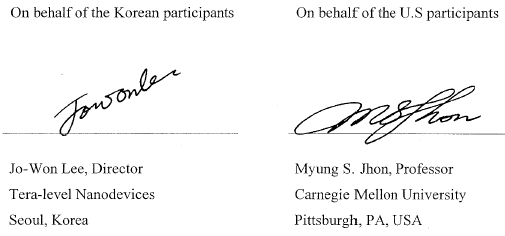
Recommendations of the First
Korea-U.S. Forum on Nanotechnology
Adopted on October 15, 2003
Forum Participants,
Today, Korea and the United States support nano-technology as an area of priority research. Recently, delegates at the fifth meeting of the Korea-U.S joint Committee on Scientific and Technological Cooperation (held October 30-31, 2002 in Seoul) agreed that the establishment of a Korea-U.S Nanoforum would be mutually beneficial to both countries in furthering nano-technological research. Specifically, a joint forum between Korea and the United States would facilitate networking between the research communities and agencies of each country. In turn, this networking will enable each country to exchange information and explore new opportunities for cooperative efforts in this vital area.
We are convinced that, as in other areas, mutual cooperation and partnership is crucial for ensuring the success of the nanoscience and technology R&D programs in both countries.
Our first forum has been very successful, with 250 participants from both countries and covering a broad range of nano research areas. The following are recommendations to ensure the continuing partnership between these two countries and, therefore, the continued success of nanoscience and technology research:
1. To promote the exchange of information and facilitate cooperation in the area of nanoscience and technology, we will select five advisory board members from each country with backgrounds in government, industry, and academia. Each advisory board member will have expertise in the area of conventional nano research, as well as topics dealing with safety, health, and environmental impact. This undertaking will be in consultation with NSF and MOST
2. As the exchange of young scientists is considered an extremely effective means for fostering education. Both countries will promote this exchange by creating a new educational initiative in which the nanoscale science and engineering centers of both countries will play a vital role. The specific focus of educational topics will be determined in the future.
3. We recommend the expansion of this forum to cover other exploratory and novel technology, using both this forum as a template as well as suggestions by selected advisory board members.
4. The national nanoscience and technology-related programs in both countries should be open to the scientists and engineers of each country under the principles of mutuality and reciprocity, including the exchange of information and invitations to academic research institutions, as well as other relevant government organizations. A first step would be to post these recommendations and a forum report on the NSF web site.
5. As the exchange of young scientists is considered an extremely effective means for fostering international collaboration as well, both countries will encourage this exchange by creating new programs to this purpose. Again the nanoscale science and engineering centers in both countries will likely play a critical role. Potential exchange topics may include topic such as nanoelectronics, nanomaterials, nanobio and energy as well as a vast array of other possibilities.
6. In the future, we recommend a more-focused “satellite forum,” or possibly additional site visits.
